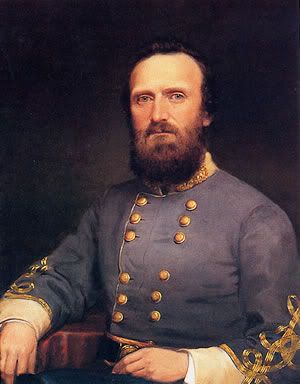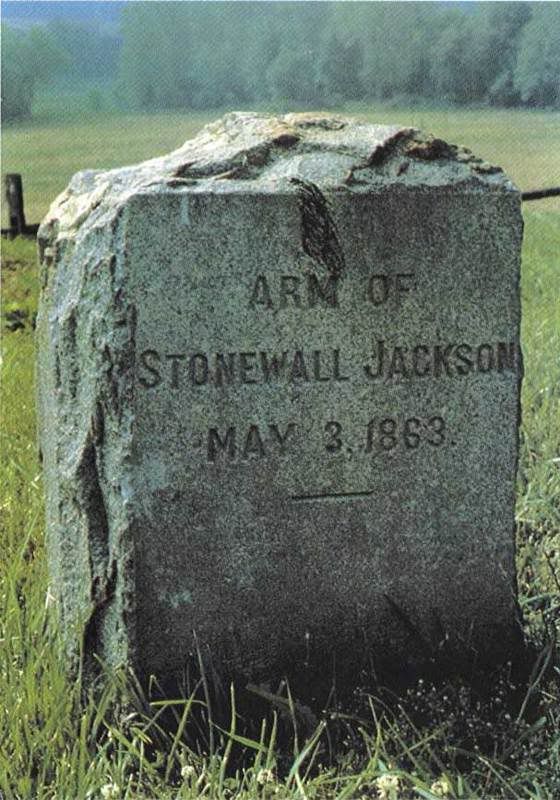
Posted on 05/10/2013 8:08:54 PM PDT by DogByte6RER
Surgeon: Pneumonia likely killed 'Stonewall' Jackson
Legendary Confederate general died 150 years ago Friday
Historians and doctors have debated for decades what medical complications caused the death of legendary Confederate fighter Thomas J. "Stonewall" Jackson, felled by friendly fire from his troops during the Civil War.
Shot three times while returning from scouting enemy lines in the Virginia wilderness, Jackson was badly wounded in the left arm by one of the large bullets the night of May 2, 1863. Blood gushed from a severed artery. It took at least two hours to get him to a field hospital, and Jackson was dropped twice in a stretcher before his arm was amputated. He died days later at age 39.
Scholars have long questioned whether it was an infection or pneumonia that killed Jackson, who gained the nickname "Stonewall" early in the war at the Battle of First Manassas and went on to be lionized in the South and feared in the North because of his military prowess.
On Friday, the 150th anniversary of Jackson's death, a trauma surgeon with experience on the battlefield in Iraq and Afghanistan revealed his diagnosis of Jackson's death after reinvestigating the medical record. After reviewing the 1860s files and subsequent reports, University of Maryland surgeon and professor Joseph DuBose told The Associated Press that Jackson most likely died of pneumonia.
DuBose is confirming the original diagnosis given by Jackson's personal physician, the famed Confederate Dr. Hunter H. McGuire.
"You would be hard-pressed to find someone more qualified than him for the treatment of this injury and taking care of Stonewall Jackson," DuBose said. "I do defer to him in some regard. I kind of have to. He's not only the treating physician; he's also the only source of information."
McGuire's original medical notes were lost when he was captured by Union soldiers. He recreated them from memory three years later for the Richmond Medical Journal.
Pneumonia was common in the Civil War, becoming the third-most fatal disease for soldiers.
Jackson was the subject of an annual conference Friday at the University of Maryland School of Medicine in Baltimore that reviews medical diagnoses of historical figures. In the past, researchers have reviewed the deaths of Alexander the Great, Edgar Allan Poe and Abraham Lincoln, among others.
DuBose is a graduate of the Virginia Military Institute, where Jackson was a professor when the Civil War broke out. A large statue of Jackson stands near the campus barracks. So, his legacy and death were ingrained in DuBose's experience as a cadet.
Jackson was shot by soldiers from the 18th North Carolina regiment in a moment of confusion. He had led a surprise attack in the Battle of Chancellorsville in Virginia, and the Confederates drove Union forces back about three miles. Civil War historian James I. Robertson Jr. recounts that Jackson wasn't satisfied and rode out at night to review the enemy's position. When he rode back, he was shot by his own soldiers.
Being dropped during a frantic nighttime rescue might have contributed to Jackson's death, DuBose found.
"If he had been dropped and had a pulmonary contusion, or bruise of the lung, it creates an area of the lung that doesn't clear secretions real well, and it can be a focus that pneumonia can start in," DuBose said. "That's probably what happened in this particular instance."
DuBose, a U.S. Air Force veteran, said pulmonary embolism -- a blockage of the major blood vessel in the lung -- still occurs in nearly 6 percent of combat casualties in Iraq and Afghanistan. It is even more common among those who have amputations, as Jackson did.
Still, the debate will continue over Jackson's death.
Dr. Philip Mackowiak, an internist who organizes the conference each year, said he differs with DuBose on the Jackson case. He reviewed the records and said he believes a recurrent pulmonary emboli destroyed Jackson's lung over time, leading to his death. The medical records don't describe Jackson coughing, as one would expect with pneumonia, Mackowiak said.
It's impossible to know for sure what killed Jackson, but DuBose said modern medicine could have saved him. Jackson's doctor didn't have the tools or knowledge to treat the complications after the shooting.
Robertson, a former Virginia Tech historian and professor who wrote Jackson's biography, said he has been persuaded that sepsis, caused by severe infection, killed Jackson, because of his chaotic rescue and unsanitary conditions. He noted, though, that doctors at the time agreed Jackson had pneumonia.
"Unfortunately, medicine in the mid-19th century was still in the Dark Ages," he said. "Obviously, I'm not overly concerned with how he died. I'm terribly concerned that he died."
Jackson was a pivotal figure and perhaps the most esteemed soldier in the war, Robertson said. He was known for secrecy and speed to execute surprise flank attacks for Gen. Robert E. Lee's strategy.
"He was killed in what may be the high-water mark of the Confederacy," Robertson said. "You can make a case that, after Chancellorsville, it's just a question of time for Lee."
 This tombstone in Orange County, Va., marks the spot where "Stonewall" Jackson's arm was buried after amputation.
This tombstone in Orange County, Va., marks the spot where "Stonewall" Jackson's arm was buried after amputation.
Like we aren't today. They gutted me like a fish in Dec 2009. I did survive it. It is barbaric.
/johnny
**”Stonewall” Jackson by Mort Künstler ***
Mort Kunsler was one of the fine artists of the men’s magazines of the 1950s and 1960s. They would do a painting, then do a story around it.
Proud to say that my four time great-grandmother from Clarksburg, VA (now W.V) was Stonewall Jackson’s aunt.
Perhaps of medical or strict historical interest. But common sense tells you, he died as a result of his wounds.
General Robert E Lee was quoted as saying “Jackson has lost his left arm, but I have lost my right”.
This appeared in a local major market newspaper.... The point exactly? This article sounds like the kind of thing I wrote in boy scouts to get my journalism merit badge.
Many of these employed as such journalists should consider themselves lucky that they didn’t have to meet THOSE standards.
I’ve always wondered if Jackson would have survived had they gotten him up, walking around in the sun, and getting a little D-3.
A quite elegant death if I remember correctly - supposedly said at the end “let’s cross the river boys, and rest in the shade of the trees”.....
I have read somewhere that Jackson’s physician was considered perhaps the best Dr. in the country. He was also one of the youngest.
He was later president of the AMA. On the day Jackson died, he seemed to be recovering a bit but Dr. McGuire told Jackson’s family that he would die that day.
There are worse things to aspire to.
/johnny
It’s hard to admit it....that one simple bad decision, which amounted to a twenty-minute effort, triggered the end of the war.
Everyone, at some point in their life, needs to make a trip to Gettysburg...spend an entire day there....and get the layout of the land and the battle.
Don’t get me wrong, I’m as Southern as you can be, but doesn’t it bother anyone that they WASTED a ton of money on something like this?
The man has been dead for 150 YEARS! Who CARES what killed him? It was how he lived that was important.
blood loss, opportunistic infection, sepsis and/or pneumonia, possible blood clots complicting things, shock.
I wish we in the South would have won
I thought that the fact that Jackson died of pneumonia was established long ago.
Would he have challenged it though? He never argued with Lee on any other orders.
Disclaimer: Opinions posted on Free Republic are those of the individual posters and do not necessarily represent the opinion of Free Republic or its management. All materials posted herein are protected by copyright law and the exemption for fair use of copyrighted works.